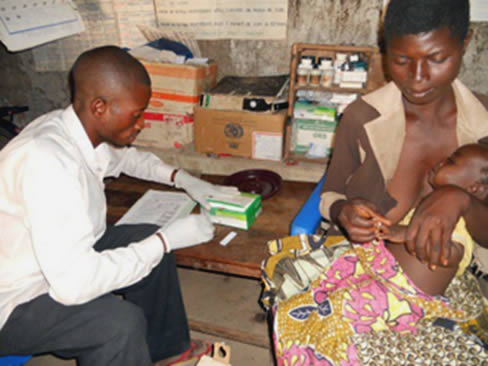
In line with DRC’s national guidelines, a community health worker in Kanda Kanda uses a rapid diagnostic test to accurately diagnose whether or not a young child has malaria. Credit : Management Sciences for Health.
In the Democratic Republic of the Congo (DRC), malaria is the main cause of deaths among children under five. Among the deaths that occur at the community level, only a small number of children with malaria symptoms are seen in health centers, and even fewer receive care at the hospital level. While timely quality care is critical when a child falls ill with malaria, it is often out of reach for many who live far from a health facility.
This is all too true in the health zone of Kanda Kanda, in Kasaï Orientale Province, where only 2,181 out of a target of 5,448 children under five with suspected malaria received facility-based care for suspected malaria in October 2013. To address the problem of distance to the nearest health facility as a barrier to care, the PMI-funded DRC-Integrated Health Project (DRC-IHP) is supporting community-based case management for malaria by establishing community care sites for populations living more than five kilometers from a health center. The Kanda Kanda Health Zone benefited from this initiative, implementing 16 community care sites for an under-five population of 29,723.
More recently, DRC-IHP also helped organize a two-day refresher training for 31 community health workers on the correct case management of malaria according to the new national protocol. Before the new policy, treatment with artemisinin-combination therapy (ACT) was administered on the basis of the presence of fever alone. As a result, ACTs were over-prescribed, which lead to frequent stockouts and sometimes resulted in delayed treatment for those truly in need. In line with World Health Organization (WHO) recommendations, the new protocol requires using a rapid diagnostic test and providing ACTs only to those patients who test positive for malaria.
As a result of these efforts, the number of cases among children that are correctly managed in community care sites increased. “It is thanks to the training on how to use the rapid diagnostic test for malaria that we correctly use this technique to save children’s lives,” affirmed Maurice Kolela, a community health worker in the Tshifumba community care site.
